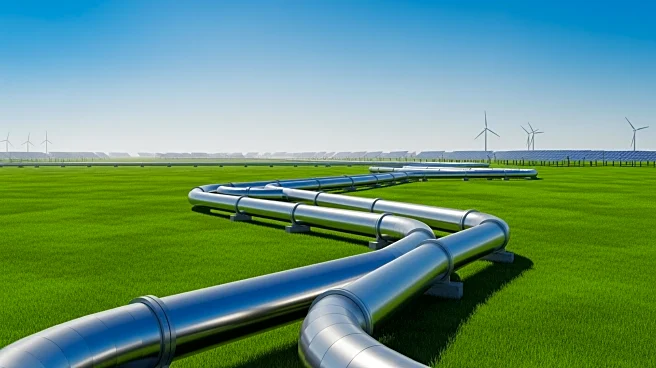What's Happening?
The Federal Energy Regulatory Commission (FERC) has reissued a certificate to Williams Companies for the construction and operation of the Northeast Supply Enhancement Project, a gas pipeline expansion
from New Jersey to New York. This decision follows discussions between President Trump and New York Governor Kathy Hochul, which led to a revival of the project after a temporary freeze on the Empire Wind project. The agreement reportedly involves a 'gas-for-wind' deal, although Governor Hochul has denied any such arrangement. Meanwhile, the U.S. has seen a significant increase in renewable energy installations, with nearly 26 GW of new generation capacity added from January to August 2025, predominantly from solar and wind sources.
Why It's Important?
The reissuance of the certificate for the Northeast Supply Enhancement Project highlights the ongoing tension between fossil fuel infrastructure development and the push for renewable energy. While the federal government under President Trump has shown support for fossil fuels, the data indicates a strong momentum for renewable energy, with solar and wind accounting for the majority of new capacity additions. This development could impact energy policy and market dynamics, as stakeholders in the renewable sector may see continued growth opportunities, while fossil fuel projects face scrutiny and potential opposition from environmental groups and certain state governments.
What's Next?
The continuation of the Northeast Supply Enhancement Project may face legal and environmental challenges, as stakeholders and advocacy groups could contest the project's impact on local ecosystems and climate goals. Additionally, the renewable energy sector is expected to expand further, with FERC projecting significant growth in solar and wind capacity over the next few years. This could lead to increased investment in renewable technologies and infrastructure, potentially influencing future energy policies and market trends.
Beyond the Headlines
The revival of the gas pipeline project amidst a strong push for renewables underscores the complex interplay between energy policy, environmental concerns, and economic interests. The 'gas-for-wind' deal, if confirmed, could set a precedent for future negotiations between fossil fuel and renewable energy stakeholders, highlighting the need for balanced energy strategies that address both economic and environmental objectives.












